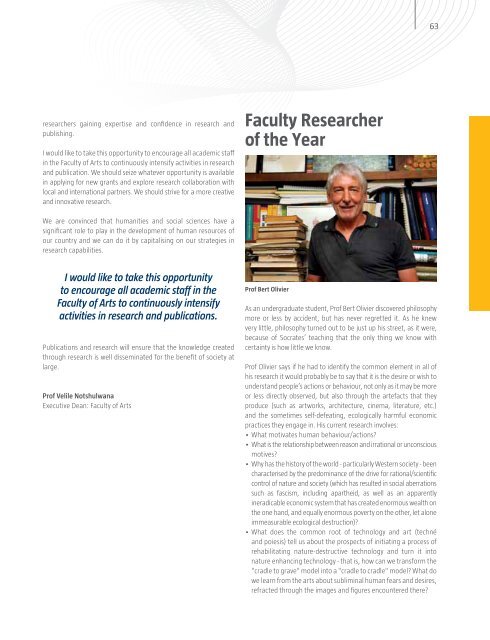2011-NMMU-Research-Report - Research Management - Nelson ...
2011-NMMU-Research-Report - Research Management - Nelson ...
2011-NMMU-Research-Report - Research Management - Nelson ...
Create successful ePaper yourself
Turn your PDF publications into a flip-book with our unique Google optimized e-Paper software.
esearchers gaining expertise and confidence in research and<br />
publishing.<br />
I would like to take this opportunity to encourage all academic staff<br />
in the Faculty of Arts to continuously intensify activities in research<br />
and publication. We should seize whatever opportunity is available<br />
in applying for new grants and explore research collaboration with<br />
local and international partners. We should strive for a more creative<br />
and innovative research.<br />
We are convinced that humanities and social sciences have a<br />
significant role to play in the development of human resources of<br />
our country and we can do it by capitalising on our strategies in<br />
research capabilities.<br />
I would like to take this opportunity<br />
to encourage all academic staff in the<br />
Faculty of Arts to continuously intensify<br />
activities in research and publications.<br />
Publications and research will ensure that the knowledge created<br />
through research is well disseminated for the benefit of society at<br />
large.<br />
Prof Velile Notshulwana<br />
Executive Dean: Faculty of Arts<br />
Faculty <strong>Research</strong>er<br />
of the Year<br />
Prof Bert Olivier<br />
63<br />
As an undergraduate student, Prof Bert Olivier discovered philosophy<br />
more or less by accident, but has never regretted it. As he knew<br />
very little, philosophy turned out to be just up his street, as it were,<br />
because of Socrates’ teaching that the only thing we know with<br />
certainty is how little we know.<br />
Prof Olivier says if he had to identify the common element in all of<br />
his research it would probably be to say that it is the desire or wish to<br />
understand people’s actions or behaviour, not only as it may be more<br />
or less directly observed, but also through the artefacts that they<br />
produce (such as artworks, architecture, cinema, literature, etc.)<br />
and the sometimes self-defeating, ecologically harmful economic<br />
practices they engage in. His current research involves:<br />
• What motivates human behaviour/actions?<br />
• What is the relationship between reason and irrational or unconscious<br />
motives?<br />
• Why has the history of the world - particularly Western society - been<br />
characterised by the predominance of the drive for rational/scientific<br />
control of nature and society (which has resulted in social aberrations<br />
such as fascism, including apartheid, as well as an apparently<br />
ineradicable economic system that has created enormous wealth on<br />
the one hand, and equally enormous poverty on the other, let alone<br />
immeasurable ecological destruction)?<br />
• What does the common root of technology and art (techné<br />
and poiesis) tell us about the prospects of initiating a process of<br />
rehabilitating nature-destructive technology and turn it into<br />
nature enhancing technology - that is, how can we transform the<br />
"cradle to grave" model into a "cradle to cradle" model? What do<br />
we learn from the arts about subliminal human fears and desires,<br />
refracted through the images and figures encountered there?


